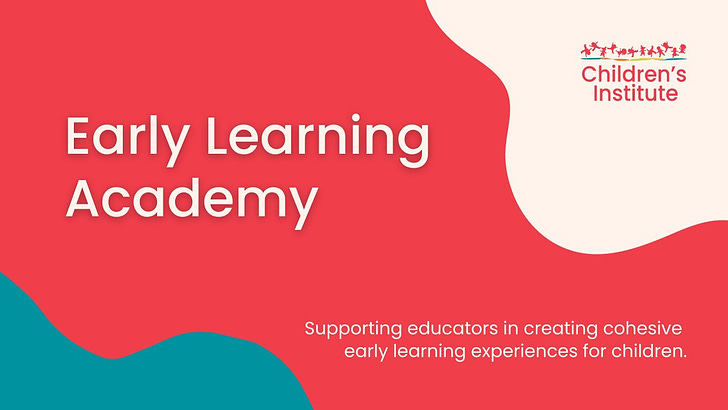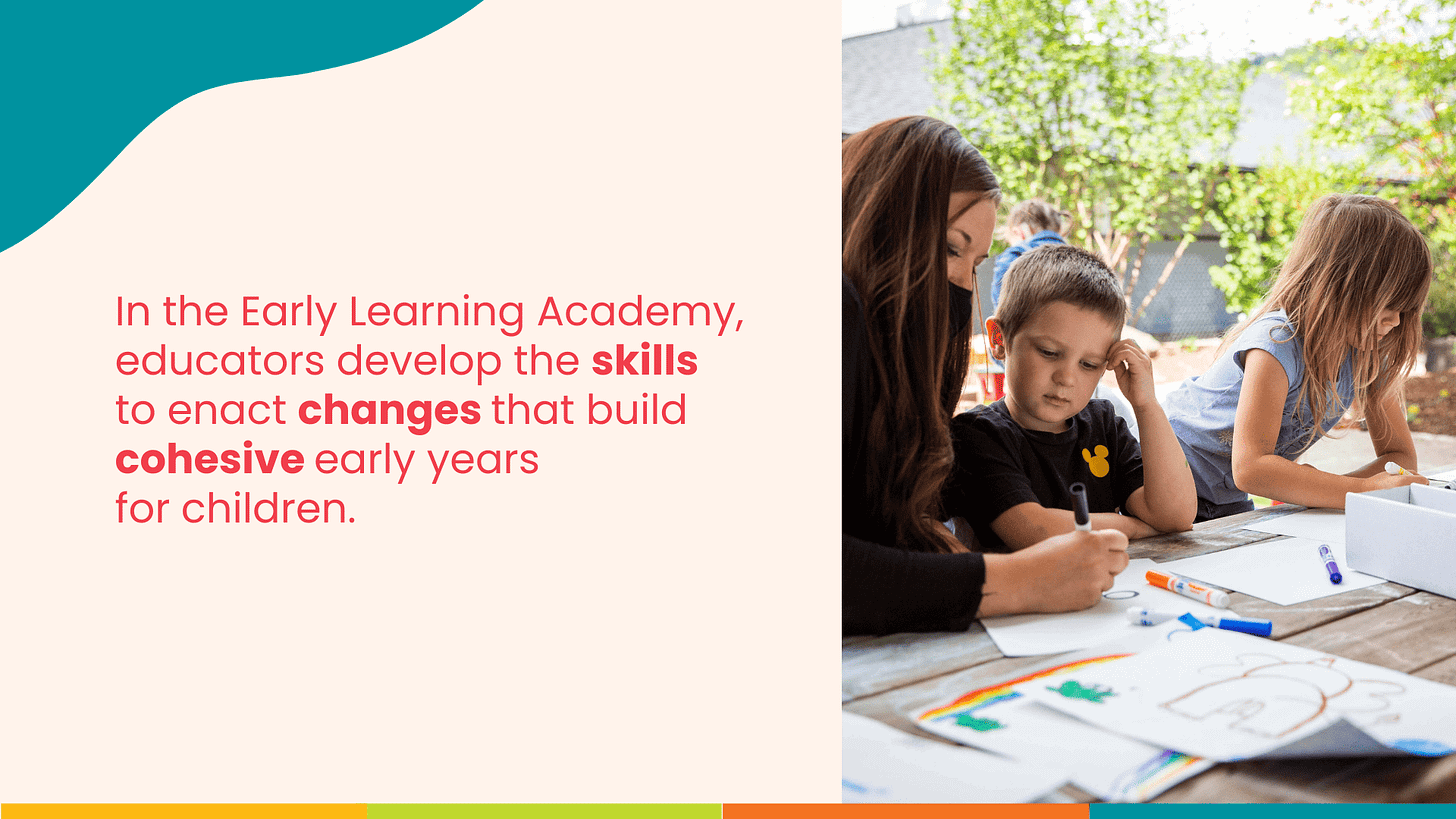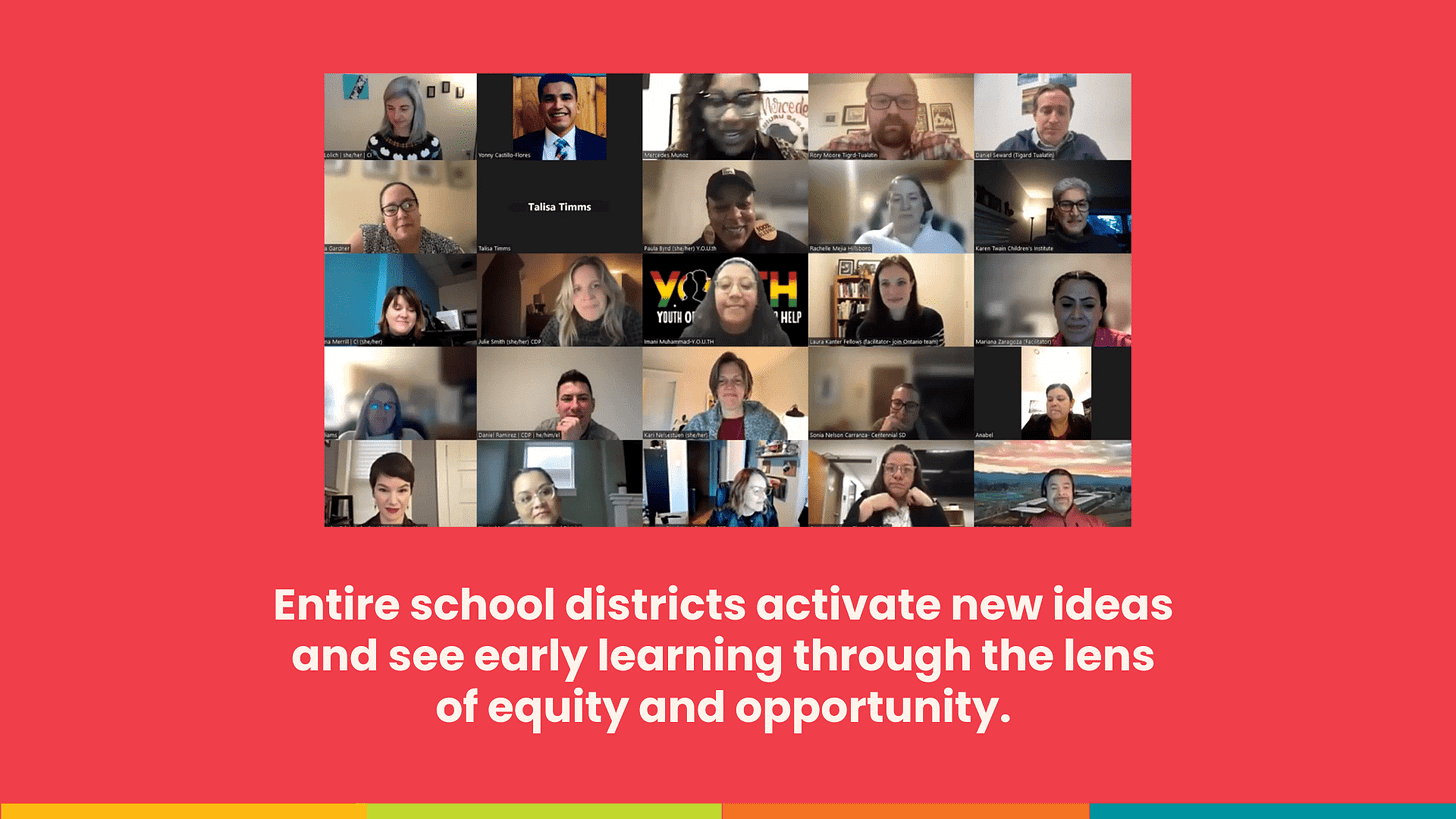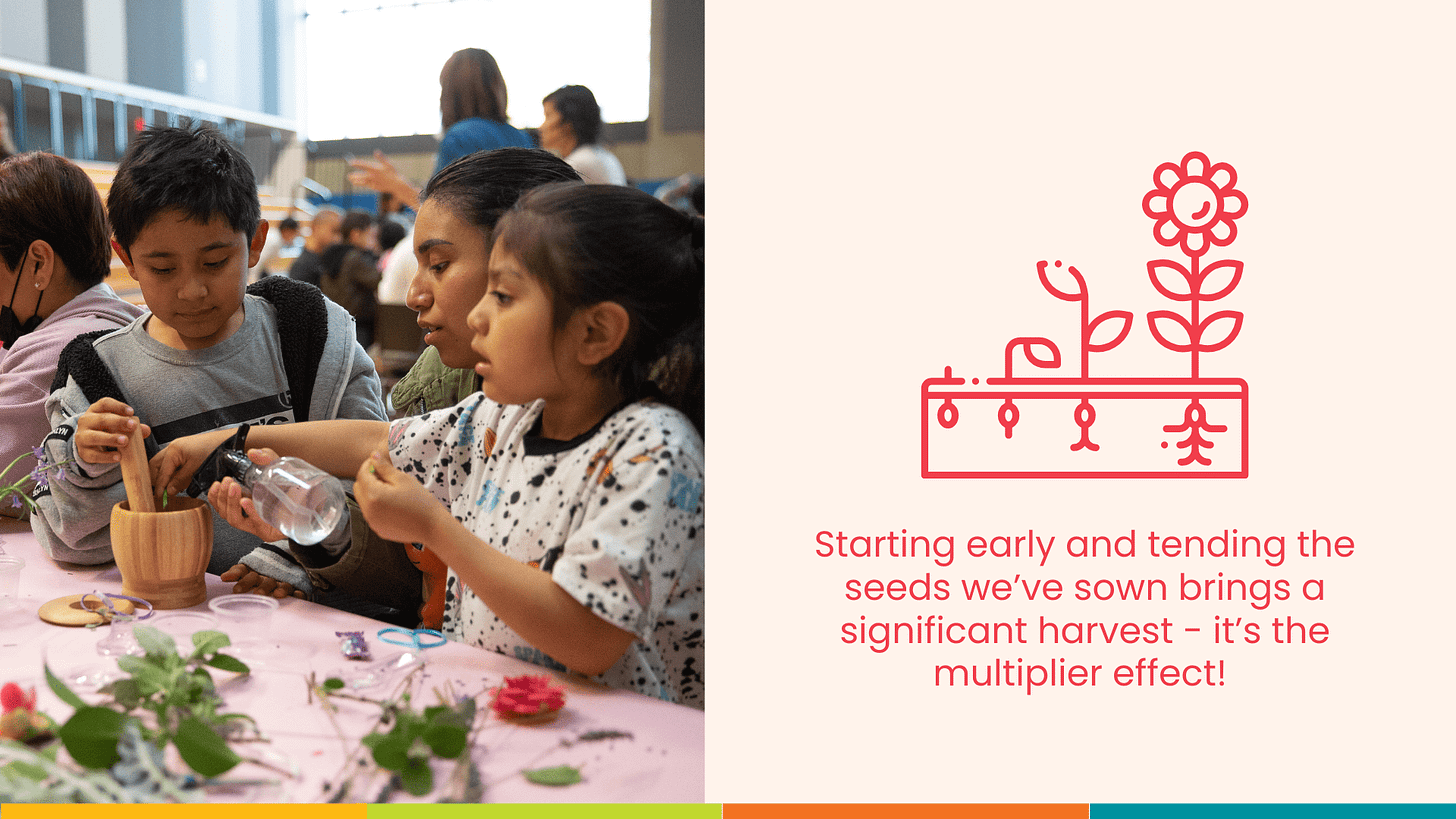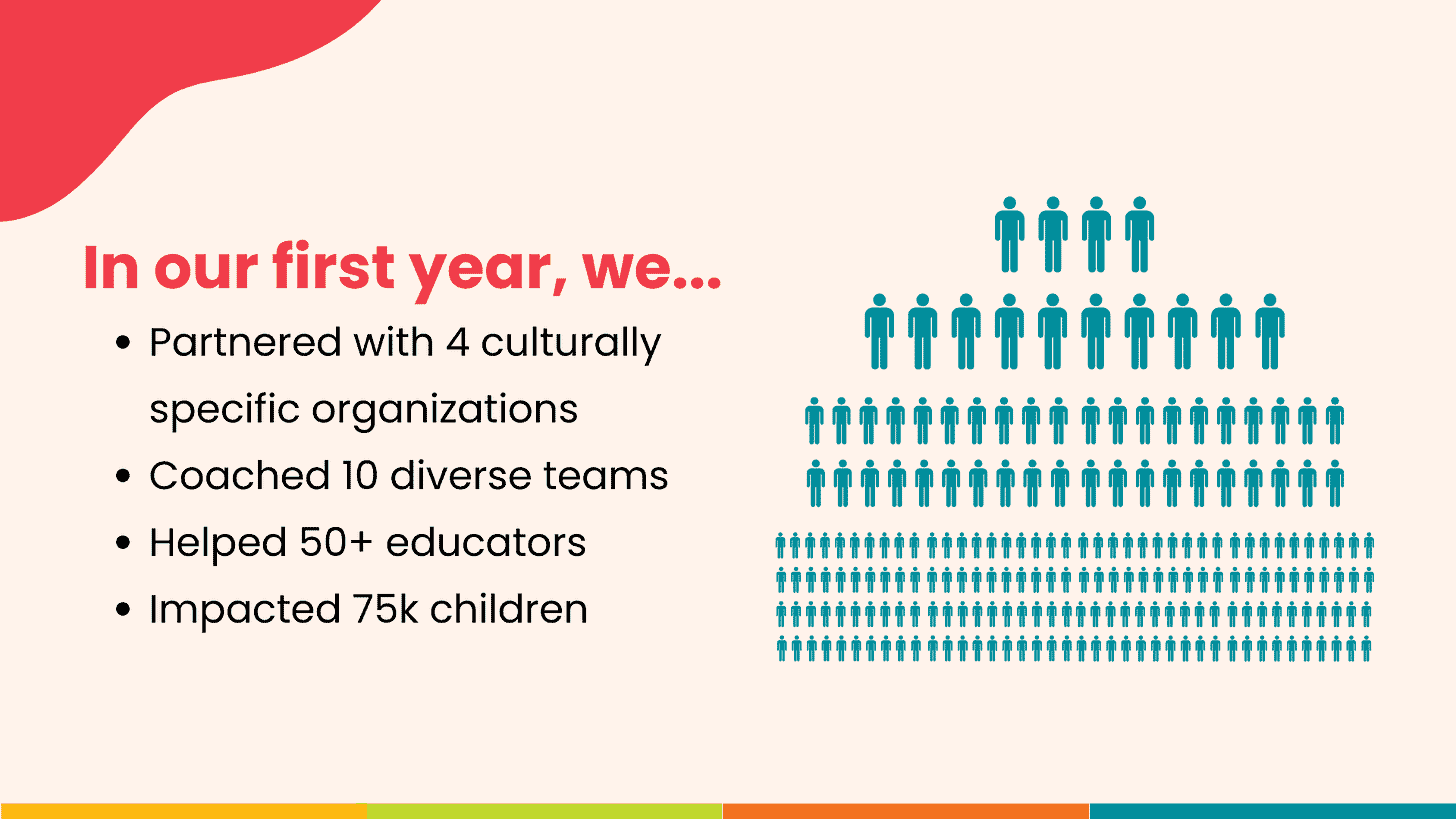A Promising Fellowship for CI & the Early Learning Academy
In 2022-23, Children’s Institute worked with Promise Venture Studio to explore how to scale the Early Learning Academy, CI’s training platform for strengthening early learning in OR school districts.
In 2022-2023, Children’s Institute (CI) worked with Promise Venture Studio to explore how to scale the Early Learning Academy, CI’s training platform for strengthening early learning in school districts in Oregon. Through an 18-week Promising Ventures Fellowship, this opportunity supported growth-stage equity-driven ventures focused on making a difference in the lives of children prenatal to age 5 and their families and caregivers. A stellar team from CI, including Kali Thorne Ladd, Erin Lolich and Erica Mullen worked together to analyze strengths and weaknesses, gather user feedback, test possibilities, and form strategies for scaling the Early Learning Academy. The final stage of the project, a pitch competition on the national stage, brought participants from the fellowship together for a final celebration and exhibition of the past year’s efforts. Read more about the experience from Kali, Erin, and Erica AND watch the final pitch at the link below.
#1: What was the original goal for being part of the Promise Ventures Fellowship?
(Erica): We started this program with the goal of figuring out how to scale the Early Learning Academy. One year ago, after launching a larger cohort than we had previously, we realized we wanted to explore our potential to expand the program – but we needed a little help. So, we applied, hoping to find guidance and learn more about how ventures scale in the early childhood field, all while building relationships with the other organizations in our cohort. We were thrilled by the opportunity to work with fellow innovators from the early childhood field in Oregon and beyond.
#2: How did you structure the project with your team and what was the thought process as you worked on different pieces of the ELA?
(Erin): Thankfully, Promise Ventures structured much of the work for us by scheduling coaching calls and deliverable deadlines. From there, we took each deliverable and thought through the right combo of skills and experience needed to do the work. For example, each of us drafted value propositions. We worked together to streamline our individual propositions, solicited feedback from our partner school districts, then worked with our coaches to polish our final proposition. Erica Mullen, our development director, is a planning and organization wizard. She really helped with structure and enlisting the right partners along the way. Kali Thorne Ladd, our CEO, is visionary. We leaned on her to deliver our pitch; we knew she would help build our movement.
#3: What do you think are the biggest ways the fellowship changed or advanced what you’ve been doing?
(Kali): Working with Promise Studio truly expanded the capacity for entrepreneurial thinking across our organization. While some of us have had specific entrepreneurial experiences, it can prove challenging to bring that frame around our mission at Children’s Institute – but this program helped us do just that in a new way. Through brainstorming sessions, mapping our program’s pros and cons, and considering opportunities we hadn’t previously incorporated, we saw new strategies for taking our programs further. It’s a paradigm shift to see impact from a business perspective, and Promise Ventures gave us fresh tools to broaden our thinking and build something meaningful with a social enterprise lens.
#4: What did you personally learn through the process?
(Erica): When we started, our coach intentionally defined the difference between scaling and starting. I’ve expanded programs before, but the idea of program development is different than starting and building out a business model for something, and we needed a stronger foundation. We also hadn’t determined our unique value proposition yet, so diving deeper into what that meant for the ELA was super helpful. While it’s not completely different from talking about the importance of programs, it’s not the same. For instance, launching something requires TESTING and experimentation, not just fostering what already exists. The cool thing is, as we experimented with our foundational ideas and services offerings, our process reflected the way we work with teachers to test and apply change ideas. And speaking of teachers- we also learned a lot by asking for feedback from the educators and administrators we serve about what they get from our program.
Lastly, one of the biggest things we learned was just that – to think bigger! For instance, if we hope to increase teacher retention by supporting their well-being and professional development, we’ll need the backing of the school district at large. The amazing teams we work with may be the users of our program, but our clients are really the school districts who make the decisions to include our program as an option for educators. Rethinking what value we can offer to the entire school district now shapes how we see the ELA growing in the future.
#5: Who do you think the Promise Venture fellowship is right for?
(Erin): Promise Venture is right for early childhood educators looking to scale their impact with a focus on equity. The fellowship provides a network, coaching, top-notch resources, and an opportunity to share an organization’s impact and vision to a national audience of colleagues and funders. The fellowship is fast-paced and requires commitment, a strong desire to learn entrepreneurial skills, and the flexibility to rethink structures and systems. I recommended it to our partners at CAIRO PDX—they have a strong focus on culturally-specific early childhood education and have big dreams to expand and serve their community.
#6: How do you hope to bring what you learned from the fellowship into what you’re working on now?
(Kali): This fellowship helped us examine our school-based initiatives from a 30,000-foot view. We learned more about how to increase our impact through existing programs AND we realized which programs weren’t ready to expand. For instance, the way the Early Learning Academy is currently structured, it’s not quite ready to be scaled, and this process illuminated that fact. But it also taught us to see our school-based initiatives on a wider scale, including what it would look like to grow to a national level.
And lastly, tackling the pitch opportunity with Promise Ventures showed us how to talk about this work in a way that gets people excited. We learned to simplify our technical descriptions into digestible language that could resonate with anyone. While this led to several follow-up connections after the event, the exercise itself proved immensely valuable in learning to package what we do. Having had this experience, our team feels more equipped to think about our mission through a communication perspective across our school-based initiatives. You can’t grow this work without bringing people into the stories and ideas at its core, and I’m thankful for the chance to hone this skill with our team. I think we’re all looking forward to seeing the ways this fellowship positively impacted our organization for years to come.

